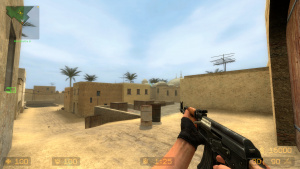Source
This page either contains information that is only partially or incorrectly translated, or there isn't a translation yet.
If this page cannot be translated for some reason, or is left untranslated for an extended period of time after this notice is posted, the page should be requested to be deleted.
Also, please make sure the article complies with the alternate languages guide.
This notice is put here by LanguageBar template and if you want to remove it after updating the translation you can do so on this page.
This page either contains information that is only partially or incorrectly translated, or there isn't a translation yet.
If this page cannot be translated for some reason, or is left untranslated for an extended period of time after this notice is posted, the page should be requested to be deleted.
Also, please make sure the article complies with the alternate languages guide.
Napomena: Samo Valve (prve) igre.
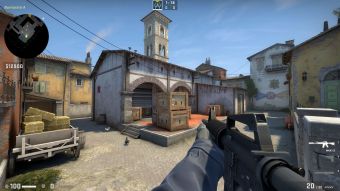
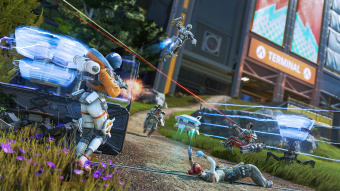
![]() Source je pogon za 3D igre koji je stvorio Valve 2004. godine, te je nasljednik GoldSrc. Source pogon je dobro poznat po svom napretku u fizici, umjetnoj inteligenciji i grafici koji je igre učinio realističnima za svoje vrijeme, dok su bile skalabilne na starijem, manje moćnom hardveru. Jedna igra, Half-Life 2, zaradio je nekoliko nagrada za svoju grafiku, što je omogućio Source. Source koristio je Valve, poduzeća trećih strana, i (slično kao GoldSrc) bezbrojna zajednica modove ljudi diljem svijeta, s najmanje 100 igara razvijenih na Sourceu. Motor također ima nekoliko grana, svaki s dodanim novim značajkama i poboljšanim grafičkim mogućnostima.
Source je pogon za 3D igre koji je stvorio Valve 2004. godine, te je nasljednik GoldSrc. Source pogon je dobro poznat po svom napretku u fizici, umjetnoj inteligenciji i grafici koji je igre učinio realističnima za svoje vrijeme, dok su bile skalabilne na starijem, manje moćnom hardveru. Jedna igra, Half-Life 2, zaradio je nekoliko nagrada za svoju grafiku, što je omogućio Source. Source koristio je Valve, poduzeća trećih strana, i (slično kao GoldSrc) bezbrojna zajednica modove ljudi diljem svijeta, s najmanje 100 igara razvijenih na Sourceu. Motor također ima nekoliko grana, svaki s dodanim novim značajkama i poboljšanim grafičkim mogućnostima.
Unatoč tome što je Source pogon star gotovo 20 godina, te ga je od 2015. godine zamijenio Source 2 pogon za korištenje prve strane, modderi i neke treće strane ga još uvijek često koriste zbog nedostatka neke Source 2 dokumentacije i rijetko je bio licenciran programerima trećih strana u usporedbi s Sourceom, a još uvijek se redovito održava s motorom i sigurnosnim ažuriranjima.
Značajke
Popis značajki i mogućnosti pogona ![]() Source. Neke nove značajke navedene ovdje možda se neće odnositi na prethodne ili kasnije izvorne grane ili igre/granu trećih strana.
Source. Neke nove značajke navedene ovdje možda se neće odnositi na prethodne ili kasnije izvorne grane ili igre/granu trećih strana.
Za popis Source grana (uključujući igre trećih strana) s njihovim posebnim novim značajkama, pogledajte stranicu ove kategorije.
Renderer
- Podržava model Shader 2.0 do 3.0
- Neke igre trećih strana također mogu podržati Shader Model 5.0 i novije pomoću Direct3D 11 i novijih, kao Titanfall branch i Strata Source.
- Anti-aliasing podrška (MSAA, FXAA, MLAA, TAA, etc.)
- Pogledajte Anti-aliasing stranicu za više informacija, značajke i nedostatke s različitim metodama anti-aliasinga.
- Više opcija za filtriranje anizotropije i teksture
- Anizotropno filtriranje omogućuje da teksture na velikoj udaljenosti izgledaju oštrije i manje mutno.
- U usporedbi s GoldSrcom (prije 2013.) koji je sadržavao samo Bilinearno ili Trilinearno filtriranje teksture, Source ima više opcija za filtriranje teksture, u rasponu od Bilinearnog, Trilinearnog, 2x anizotropnog do 16x.
- Bump mapping i Normal mapping na modelima i svijetu
- Autor shadera s HLSL
- Mapiranje kocke i okoline
- Cubemapping također podržava anizotropiju (u svim igrama od
 )
)
- Cubemapping također podržava anizotropiju (u svim igrama od
- Phong sjenčanje za modele
- Phong je također podržan na svjetskim kistovima (u svim igrama od
 )(također u
)(također u  )
)
- Phong je također podržan na svjetskim kistovima (u svim igrama od
- Dinamička svjetla, osvjetljenje vrhova i lightmap, mnoge vrste svjetla uključujući treptanje, pulsiranje itd.
- HDR (u svim igrama od
 ) i LDR (SDR) osvjetljenje
) i LDR (SDR) osvjetljenje
- LDR je zastario od
 Left 4 Dead engine branch. Ovo se ne odnosi na neke igre kao što je originalno izdanje Dota 2, na primjer.
Left 4 Dead engine branch. Ovo se ne odnosi na neke igre kao što je originalno izdanje Dota 2, na primjer.
- LDR je zastario od
- Voda s lomom, odrazima svijeta u stvarnom vremenu i fresnel efektima
- Voda također podržava mapiranje toka (u svim igrama od
 )
)
- Voda također podržava mapiranje toka (u svim igrama od
- Napredni sustavi čestica koji mogu emitirati sprite ili modeli
- Render-to-texture jene dopuštaju veliki broj znakova po sceni
 (također u
(također u 
 )
) - Entiteti okludera za blokiranje vidljivosti
- Unutarnje/Vanjsko okruženje
- Deformabilan teren
- 3D Skyboxovi proširuju horizont i dodaju paralaksu udaljenim objektima
- Dinamički prikazani organski elementi (trava, drveće itd.)
- Stabla koja se njišu (u svim igrama od
 ) (također u
) (također u 


 )
)
- Površine podjele, difuzne i zrcalne mape neravnina
- Radiosvjetljenje u stvarnom vremenu
- Kaskadno mapiranje sjena u stvarnom vremenu koje dolazi iz skyboxa (u svim igrama od
 ) (također u
) (također u 

 )
) - Učinci uključuju, ali nisu ograničeni na: čestice, zrake, volumenski dim, iskre, krv i učinke na okoliš poput magle i kiše
- Skalabilnost
- Okluzija ambijentalnog prostora zaslona (SSAO) (samo u

 )
)
- Tehnika za učinkovitu aproksimaciju učinka ambijentalne okluzije u stvarnom vremenu.
- Podrška za široki zaslon
- Source je jedan od najranijih pokretača igara koji nativno podržava Widescreen monitore (omjer širine i visine 16:9 i 16:10) bez rastezanja slike, dok je većina igara iz tog doba obično dizajnirana samo za 4:3/5:4 zaslone.
igre kao što je Half-Life 2 podržavaju široki zaslon pri lansiranju 2004., s horizontalnim FOV (vidnim poljem), što vam omogućuje da vidite više detalja.
- Source je jedan od najranijih pokretača igara koji nativno podržava Widescreen monitore (omjer širine i visine 16:9 i 16:10) bez rastezanja slike, dok je većina igara iz tog doba obično dizajnirana samo za 4:3/5:4 zaslone.
- Fizički utemeljeno renderiranje (samo u




 )
) - Mapiranje okluzije paralakse(samo u

 )
) - Podržava različite grafičke API-je (Direct3D, OpenGL, Vulkan)
- Direct3D verzije
- Direct3D 9
- Razine kompatibilnosti s DirectX-om za starije grafičke kartice:
- DirectX 7.0 (Source 2004/2006 ili samo RTX Remix igre)
- DirectX 8.0 (
dxlevel 80shaderi s fiksnom funkcijom) - DirectX 8.1 (
dxlevel 81isto kao gore, s glatkim sjenama) - DirectX 9.0 (
dxlevel 90) - DirectX 9.0+ (
dxlevel 95)  Bilješka:Razine kompatibilnosti s DirectX više nisu podržane od Left 4 Dead engine branch.
Bilješka:Razine kompatibilnosti s DirectX više nisu podržane od Left 4 Dead engine branch.
Također, bez obzira koji jedxlevelpostavljen na, sve izvorne igre uvijek će raditi na Direct3D 9.
- Direct3D 9Ex (u svim igrama od
 ) (također u
) (također u  ) - DX9 Windows Aero proširenja, zahtijeva Vista ili noviju verziju. Korisnik može omogućiti/onemogućiti u Video postavkama - Napredno (Windows Aero proširenja) ili putem
) - DX9 Windows Aero proširenja, zahtijeva Vista ili noviju verziju. Korisnik može omogućiti/onemogućiti u Video postavkama - Napredno (Windows Aero proširenja) ili putem -disable_d3d9ex(samo u ).
). - Direct3D 11 (samo u


 )
) - Direct3D 12 (samo u
 )
)  Bilješka:Direct3D 9 može se forsirati opcijom pokretanja
Bilješka:Direct3D 9 može se forsirati opcijom pokretanja -dx9, ako je forsirano naredbama kao što je-gamepadui, koja omogućuje i Gamepad UI i Vulkan renderer osim ako se ne kombinira s-dx9
- Direct3D 9
- OpenGL(u svim igrama od
 /
/ ) koji je još jedan grafički API koji se koristi u Source igrama na macOS i Linux.
) koji je još jedan grafički API koji se koristi u Source igrama na macOS i Linux.
dxlevel 92je OpenGL ekvivalent DirectX 9 Shader Model 3 (D3D9.0c)
- Vulkan grafički API (samo u





 )
)
- Nasljednik OpenGL-a, Vulkan se može koristiti za rješavanje raznih grafičkih problema kao što su projicirane teksture na Portalu 2, koje se ne prikazuju ispravno na novijim grafičkim upravljačkim programima (i NVIDIA i AMD). Omogućite Vulkan koristeći
-vulkanopcije pokretanja.
- Nasljednik OpenGL-a, Vulkan se može koristiti za rješavanje raznih grafičkih problema kao što su projicirane teksture na Portalu 2, koje se ne prikazuju ispravno na novijim grafičkim upravljačkim programima (i NVIDIA i AMD). Omogućite Vulkan koristeći
Materials System
- Instead of traditional textures, Source defines sets of materials that specify what the object is made from and the texture used for that object. A material specifies how an object will fracture when broken, what it will sound like when broken or dragged across another surface, and what that object's mass and buoyancy are. This system is much more flexible than other texture-only systems
- Materials can interact with objects or NPCs, such as mud or ice for vehicles to slide/lose traction on
Multiplayer Network Code
- Time- and gamer-tested by millions of gamers around the world
- Support for both LAN-based multiplayer and Internet-based multiplayer games
- Prediction analysis for interpolating collision/hit detection
- Optimizations for high-latency, high-packet-loss 56k connections
Advanced Characters
- Detailed and believable characters
- Realistic eyes
- Focus on player/object, not simply parallel views
- Proper eye bulge for realistic eye reflections
- Simulated musculature provides outstanding emotions, speech, and body language
- Language independent speech, characters can speak naturally in many languages
- Skeletal/bone system for animation
- Layered animation system can synthesize complex animations out of several pieces
Physics
- Uses Havok physics engine, licensed from Havok Group (now acquired by Microsoft)
- More responsive world with realistic interactions
- Sounds & graphics follow from physics
- AI characters can interact with physically simulated objects
- Ropes/cables, machines, constraint systems, ragdoll physics
- Can be controlled by level design
- Kinematic animated bone followers
- Custom procedural physics controllers
- Vehicles
- Wheels slip and skid
- Realistic suspensions with springs on each wheel
- Realistic leaning during acceleration/deceleration and turning
- Individually tunable parameters such as horsepower, gearing, max speed, shift speed, tire material, tire friction, spring tension/dampening, etc.
- Multiple players in a vehicle in multiplayer
- Hovercraft support for cheaper simulation
Advanced AI
- I/O system allows level designers to control AI
- Sophisticated navigation: characters that run, fly, jump, crouch, climb stairs and ladders, and burrow underground
- AI senses things using sight, sound, and smell
- AI relationships determine friend/foe status of other entities
- Battle AI allows squads of AI characters to operate together, know when to advance, retreat, lay cover fire, etc.
Sound System
- 7.1, 5.1 surround sound, 4 speaker surround
 Greška:On system running Windows Vista and later, due to the game engine using DirectSound and older version of Miles Sound System, the game may output only 5.1 surround despite 7.1 selected or 7.1 audio may not work properly without custom
Greška:On system running Windows Vista and later, due to the game engine using DirectSound and older version of Miles Sound System, the game may output only 5.1 surround despite 7.1 selected or 7.1 audio may not work properly without custom dsound.dll(such as Creative Alchemy, DSOAL or IndirectSound). This issue is not affected by some third-party games, such as Titanfall 2, Apex Legends as they used newer version of Miles Sound System. Bilješka:Some or newer Source games (such as Alien Swarm, Portal 2 and Counter-Strike: Global Offensive) may not include options to enable 7.1 surround sound without using console commands.
Bilješka:Some or newer Source games (such as Alien Swarm, Portal 2 and Counter-Strike: Global Offensive) may not include options to enable 7.1 surround sound without using console commands.
- High-quality 3D spatialization
- Custom software DSP
- Automatic DSP based on environmental geometry
- Microsoft ADPCM-compressed WAV files
- 16-bit 44.1 KHz (CD Quality), stereo wave data with all features
 Bilješka:Source does not support 48 KHz audio (DVD Quality) by default.
Bilješka:Source does not support 48 KHz audio (DVD Quality) by default.
- MP3 decompression (requires Miles license)
- Support for audio streaming on any wave [Pojasnite]
- Real-time wave file stitching [Pojasnite]
- Pre-authored Doppler effect encoded waves
- Pre-authored distance variant encoded waves
- Commentary system
UI
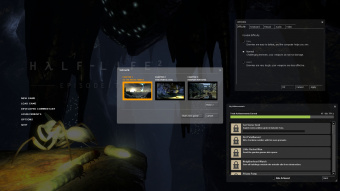
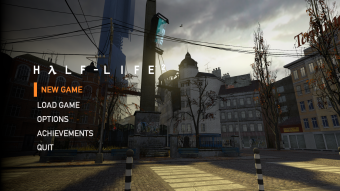
- Server browser — Displays all active game servers and allows a player to choose which one to participate in. Players can filter and sort server lists to speed up the display and selection of a server.
- VGUI — Valve's custom GUI interface mimics most of the Windows controls but is rendered using the Source engine for both in game and out of game uniform UI display. Some features:
- Dynamic in-game HUD display
- Many widgets/controls (e.g., buttons, treeview, html control…)
- Themes/custom visualization allowed
- Platform independent
- Localized text (Unicode compliant)
- Gamepad UI (
 Source 2013 version) — Since the release of Half-Life 2 (and its episodes) as well as Portal updates in 2022, Valve have added a modern UI which is designed for consoles and handhelds like
Source 2013 version) — Since the release of Half-Life 2 (and its episodes) as well as Portal updates in 2022, Valve have added a modern UI which is designed for consoles and handhelds like  Steam Deck. With the new Gamepad UI, it was more scalable across any resolution (including 4K and higher), unlike the regular VGUI (which, the higher the resolution, the text and UI will become smaller). This UI can be also enabled manually by using
Steam Deck. With the new Gamepad UI, it was more scalable across any resolution (including 4K and higher), unlike the regular VGUI (which, the higher the resolution, the text and UI will become smaller). This UI can be also enabled manually by using -gamepaduicommand line argument (which will also enable Vulkan renderer that may not work on some older GPUs unless-dx9is used in combination of-gamepadui).
- Scaleform (officially called Scaleform GFx) — Introduced with CS:GO engine branch at launch until 2018, this is a vector graphics rendering engine used to display Adobe Flash-based UI and HUD for games.
- Panorama (u svim igrama od
 ) — Introduced in 2018, replacing Scaleform, Valve's new Custom GUI interface that resembles modern web design and authoring (HTML5/CSS/JS). Using
) — Introduced in 2018, replacing Scaleform, Valve's new Custom GUI interface that resembles modern web design and authoring (HTML5/CSS/JS). Using .XMLand JavaScript files, developers can create dynamic and clean HUDs and menus and even high-quality in-game intractable panels.
Programming
- Source natively support various CPU architectures, such as x86 (PC and 8th, 9th-gen Consoles), ARM (
 Android,
Android,  Nintendo Switch), PowerPC (
Nintendo Switch), PowerPC ( Xbox 360,
Xbox 360,  PlayStation 3), and more, with both 32 and 64-bit.
PlayStation 3), and more, with both 32 and 64-bit.
- Support for 64-bit architecture will allow Source to handle more than 2-4GB of RAM limit.
- Historically, Half-Life 2 had a 64-bit update in 2005, but it was later removed for unknown reasons. CS:GO later received an 64-bit update in 2016 for Mac and Linux systems. On April 19, 2024, Team Fortress 2 was upgraded to 64-bit on Windows and Linux.
- All code written in C/C++ using Visual Studio .NET 2003 and later. Easily and quickly derive new entities from existing base classes
- Source SDK 2013 code, by default, can be compiled on Visual Studio 2013 only. See Compiling under VS2022 if you want to compile Source 2013 with newer versions of Visual Studio.
- Linux version are compiled using GNU Compiler Collection.
- Internal context sensitive performance monitoring system
- Graphics performance measurement tools built into the engine
- Modular code design (via DLLs) allows swapping out of core components for easy upgrading or code replacement
- VScript scripting system allows using external coding languages, such as Squirrel and Lua, in maps to create more complex systems (u svim igrama od
 ) (također u
) (također u 
 )
)
Tools
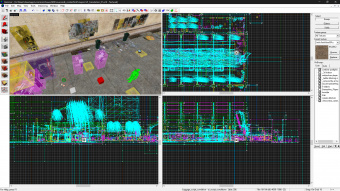
 HLFaceposer
HLFaceposer
- Facial expression tool used to craft speech and emotions
 Valve Hammer Editor
Valve Hammer Editor
- WYSIWYG World editor
- Create world brushes
- Terrain editor
- Place detailed world models and AI NPCs
- Set navigation points/paths for NPCs
- Place triggers, clip brushes, logic, etc.
- Allows level designer to hook up I/O between entities to control AI within the game
 Half-Life Model Viewer
Half-Life Model Viewer
- Full model previewer
- Rotate models in any direction
- Set up hit boxes
- View physics hull
- View normals
- Wireframe, shaded or textured view modes
- Studiomdl
- Model compiler
- VBSP, VRAD, VVIS, VMPI
- Map compilation tools (bsp, lighting and visibility)
- VMPI — distributed compilation tool allowing level compiles to be spread across many PCs greatly reducing compile times
- Exporters
- XSI, Max and Maya
.smdexporters for exporting 3D models
- XSI, Max and Maya
Branches
The Source engine has multiple branches, each of them adds new features and changes. The latest version is Source 2013, which has two sub-branches: Singleplayer and Multiplayer, the Multiplayer branch has additional features not available on Singleplayer sub-branch. Games such as Left 4 Dead to Counter-Strike: Global Offensive also introduces many newer features and graphical improvements. Both Source 2013 and Alien Swarm engine branch engine code are publicly available.
Some third-party games may also have their own engine branches, with many new features that are not available with any official Source branch.
- For the list of Source engine branches (including third-party branches), see List of Source engine branches.
Proizvodi koji koriste Source 



Ovo je popis igara koje koriste pogon ![]() Source.
Source.
Proizvodi koje proizvodi Valve
| Release date | Title | Co-developed with | Engine branch | Platforms | Notes |
|---|---|---|---|---|---|
| 7 lis 2004 | |
Turtle Rock Studios Hidden Path Entertainment (2010 update) |
|
PC: Windows, Mac, Linux | First game to use the Source engine. Remake of Counter-Strike. Hidden Path Entertainment alongside Valve worked on the May 7, 2010 update, which upgraded the game's engine from Source 2006 to 2009 (MP version, later renamed to Source MP), and added 144 (now 146) achievements, a new domination and revenge system similar to Team Fortress 2, player stats and more. Hidden Path Entertainment also worked on the unreleased Xbox 360 port of CS:S, which would later become |
| 16 stu 2004 | |
|
PC: Windows, Mac, Linux | Remaster of Half-Life. It is critically panned by most gamers since 2013 due to the huge amount of bugs that were introduced when the game was updated to A unofficial fan remake of Half-Life, called Black Mesa was later started development in response of those criticisms, which was first released in 2012 without any Xen chapters and was much shorter, and later in 2020, a full release with contains the Xen chapters. |
|
| 16 stu 2004 | |
EA UK (PS3 port) | |
PC: Windows, Mac, Linux Console(s): Original Xbox, Xbox 360, PlayStation 3 |
Sequel to Half-Life, and later Half-Life: Alyx. Included on The game was set 20 years after the event of Half-Life, takes place in City 17, which is under Combine control. Prior to its release, it was delayed multiple times, and infamously leaked in Oct 2003. It was among the first games to require Steam in order to play. Half-Life 2's engine branch has been updated multiple times, first in 2007, upgraded to Source 2007 only on consoles, and in 2010, upgraded to Source 2009 on PC, and finally, Half-Life 2 was upgraded to the Source 2013 Singleplayer branch. In November 2024, Valve released a 20th anniversary update, which add Steam Workshop support, fixing several bugs, improved shaders (with option to use classic 2004/2006 particles/effects and Very High shader option), and made Half-Life 2: Lost Coast, Episode One and Episode One playable through Half-Life 2 main menu, without quitting the game and launch it separately on Steam client. |
| 30 stu 2004 | |
|
PC: Windows, Mac, Linux | Multiplayer component of Half-Life 2. Now runs on Team Fortress 2 branch after 20th anniversary update. | |
| 26 ruj 2005 | |
|
PC: Windows, Mac, Linux | Remake of Day of Defeat. Like Half-Life 2: Lost Coast, it also have features later added to Source 2006, such as HDR lighting. | |
| 27 lis 2005 | |
|
PC: Windows, Mac, Linux | Originally as part of Half-Life 2, which was cut at some point before it was released, and was developed after the leak happened but was ultimately cut, then later released in 2005 as a HDR lighting technology demo. It runs on a newer version of Source 2004, introducing new features such as Commentary System and HDR (which was previously introduced on Day of Defeat: Source). Both of these new features are later used in Half-Life 2: Episode One, which runs on Source 2006 engine, and subsequent games & branches after it. As of 2025, it runs on |
|
| 1 svi 2006 | |
|
PC: Windows, Mac, Linux | Multiplayer component of Half-Life: Source. Now runs on Team Fortress 2 branch since February 18, 2025 update. | |
| 1 lip 2006 | |
EA UK (PS3 port) | |
PC: Windows, Mac, Linux Console(s): Xbox 360, PlayStation 3 |
The game is the sequel to Half-Life 2, and the story begins after the Citadel reactor core was destroyed, Gordon and Alyx both survived the explosion. When it's come to technical, it used the |
| 10 lis 2007 | |
EA UK (PS3 port) | |
PC: Windows, Mac, Linux Console(s): Xbox 360, PlayStation 3 |
A sequel to Half-Life 2: Episode One. The City 17 has been destroyed, and the Citadel was partially collapsed, Gordon and Alyx has survived the train crash. The game largely take places in White Forest. Story aside, when it's come to technical, it uses the |
| |
PC: Windows, Mac, Linux Console(s): Xbox 360, PlayStation 3, Nintendo Switch (part of Portal Companion Collection) |
A completely new game and IP from Valve, set in the Half-Life universe, and take places in Aperture Laboratories. It is a puzzle-based shooter game, allowing you to create portals, that link to one another on any flat and large enough surface. In 2023, an unofficially remastered version of the game, Portal with RTX, was released, which takes advantage of hardware that support ray-tracing, and adds PBR textures, high polygon models in order to improve the game graphics. Like the other two new games in The Orange Box package, it used the |
|||
| |
|
PC: Windows, Mac, Linux Console(s): Xbox 360, PlayStation 3 | Sequel to Team Fortress Classic, focusing on cartoon graphics unlike the pre-release footage/screenshots, which aimed to be more realistic. This is the last game, along with 2 other games as part of The Orange Box pack to use the engine branch that requires Half-Life 2 assets to operate. The console version of the game is no longer updated, as opposed to PC version of the game, which is frequently updated. It has its own version of Source 2013 Multiplayer which is more up to date and has newer features in what's named the Team Fortress 2 branch. |
||
| 17 stu 2008 | |
Turtle Rock Studios (under Valve South) |
|
PC: Windows, Mac Console(s): Xbox 360 |
A new multiplayer co-op game, with a horror zombie theme. It use a new engine branch which does not require Half-Life 2 assets in order to work, it also adds many new features and introduced VPKs. |
| 17 stu 2009 | |
|
PC: Windows, Mac, Linux Console(s): Xbox 360 |
Originally was planned to be an update for Left 4 Dead, it was later released as standalone game. Like Left 4 Dead, it also runs on the same L4D branch, but much newer. Like TF2, the console version ( This game was also ported to Source 2 back in 2014, but this version remains unreleased to this day, and one of its maps has been remade in Source 2 as a tech demo back in 2010, which its image was leaked in 2014. |
|
| 19 srp 2010 | |
|
PC: Windows | A co-op alien shooter, which was a remake of the Unreal Tournament 2004 mod with the same name. It succeeded the |
|
| 18 tra 2011 | |
|
PC: Windows, Mac, Linux Console(s): Xbox 360, PlayStation 3, Nintendo Switch (part of Portal Companion Collection) |
Has its own engine branch, and once again, introduced new features and succeeded |
|
| 21 kol 2012 | |
Hidden Path Entertainment | |
PC: Windows, Mac, Linux Console(s): Xbox 360, PlayStation 3 |
Sequel to Counter-Strike: Source, originally developed as a Xbox 360 port of Counter-Strike: Source before Valve eventually turned it into a new Counter-Strike game. The game runs on the CS:GO engine branch, which is based off of the Left 4 Dead engine branch with Portal 2 engine branch code. CS:GO used Source 1 engine until 2023, now uses the new Source 2 engine under the name Counter-Strike 2, replacing CS:GO (except the console version). Console version is no longer updated since 2013, but remains purchasable. Prior to being delisted, it was Free to Play on PC since 2018. |
| 9 srp 2013 | |
|
PC: Windows, Mac, Linux | Sequel to 2003's Warcraft III mod, Defense of the Ancients (retroactively called as Dota 1, DotA for short). Formerly using Source until 2015, when Dota 2 was ported to Source 2, as part of Dota 2's Reborn update. This is the last Valve game to be released on the Source engine. |
Treća strana
Igre, alati i modifikacije koje su izradile tvrtke treće strane i timovi modifikacija.
Released
|
|
U razvoju (neobjavljeno)
Ovaj odjeljak je za neobjavljene igre i alate trećih strana koji su najavljeni i trenutno su u razvoju, nisu javno objavljeni, u Beta/Early Accessu su ili se planiraju objaviti.
|
Više igara Source Engine treće strane
Vidi također
- Wikipedia:Source (game engine)
- Značajke Source Pogona
- Source SDK
- Source SDK Dokumentacija
- Source SDK 2013
Vanjske poveznice
- Službena web stranica (arhivirano) - Službena web stranica o Source pogon
- Vodič za Source Engine https://www.sourcemodding.com/tutorials/source
- Vodiči za Source Engine https://gamebanana.com/tuts/games/35
- Vodiči - Source - Mod DB https://www.moddb.com/engines/source/tutorials
- Stranica s problemima na GitHubu - za izvješća o pogreškama motora.

